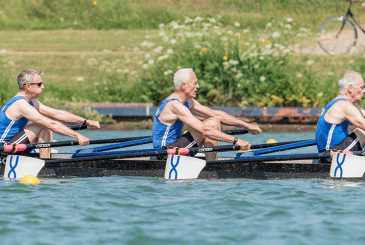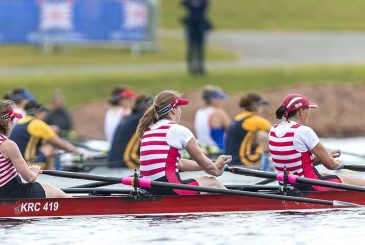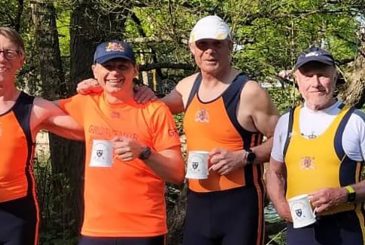In the second article in our new series for master rowers, Patricia Carswell looks at how you can balance training and recovery
“It’s not how old you are,” said the French author Jules Renard, “but how you are old.” As the years pass and our bodies develop creaks and niggles, we have to pay more and more attention to how we train and care for them.
There’s no denying that rowing becomes increasingly challenging as we age. As experienced rower, rowing coach and coach educator Rosie Mayglothling explains, with each passing year we lose muscle mass, and our maximal heart rate and aerobic capacity decline. Yet that doesn’t mean we have to hang up the rigger jigger. You only have to look at the masters categories in any race to see it’s possible to row well into old age, and studies show that exercise will help to delay physical and mental decline.
Some rowers have a natural advantage, of course. “You can’t get away from your genetic base,” says Rosie. Those who have trained consistently throughout their lives tend to cope better with the rigours of rowing. “It depends a bit on your background, your body type and what you’ve done in the past. Some people have a fantastic endurance base behind them.”
Yet there’s a lot that even late onset rowers can do to maximise their chances of rowing into their twilight years. The first thing, says Rosie, is being sensible about rest days. “We don’t recover so well from sessions or from illness and injury, so we have to allow enough time to recover.”
“Stability and core are more important as you get older – you need to spend time on your core to avoid back injuries”
She also recommends sticking rigorously to the 80:20 ratio of low intensity to high intensity training. “Many of us came up through the era where we did lots of high intensity training,” which was seen as an efficient way of managing time. This is no longer considered to be the best way to train.
Technical training can be our friend here, and Rosie recommends focusing on quality over quantity. “A good 14K is better than ploughing on for 16K or 18K. It’s about the quality of what you do.”
Mobility and core work are essential as we age. “We really need to think about stretching for maintaining flexibility,” says Rosie. “Whereas perhaps as a 20-year-old you would leap out of the boat, leap on your bike and go home, now you actually need to spend time on it. Stability and core are more important as you get older – you need to spend time on your core to avoid back injuries.”
Resistance training is essential for maintaining muscle mass and bone density, too. “Women in particular need to maintain their upper body strength,” says Rosie. This needs to be more than an occasional event – to get the benefits, “you really need to do it twice a week”. If you don’t have access to a weights room, Rosie recommends body weight, resistance band or suspension training.
Cross training is a fantastic way to keep an ageing body in good nick. “Rowing is such a one-dimensional sport,” says Rosie, “so we need to make sure we’re exercising the whole body and giving it a break.”
“It’s partly about being with friends, being sociable and challenging yourself. It’s not just about winning”
Of course, fitting all of these elements into an already busy schedule can be a challenge, so you need to be smart about your training. Mobility can be done as part of a rowing training session, done before and after you row (making sure you do your post-row stretch while you’re still warm), and you can get cross training in by cycling to work or training.
Finally, pay attention to your diet, making sure that you have a balanced diet with enough protein (our protein requirements increase after the age of 60, according to research). More of this in a later article. This doesn’t mean you need protein shakes or supplements, says Rosie. “If you do a heavy session, have something like a cheese sandwich quickly afterwards.”
Hydration is also important, she advises. “My generation would never have taken a water bottle in the boat, but it’s important to stay properly hydrated.”
Finally, keep a sense of perspective and remember to enjoy your rowing.
“It’s partly about being with friends, being sociable and challenging yourself. It’s not just about winning.”
Meet the masters

Frances Lester is 78 and rows competitively at Monmouth Rowing Club. She started rowing at the age of 51 with the parents’ rowing club at her son’s school and migrated from there to Walbrook Rowing Club before moving to Wales.
Certain elements of rowing training have got tougher as the years have passed, says Frances. “I find anything over 26 or 28 [spm] more of a challenge, and I can’t lift as much weight as I used to.”
“The secret to her ability to row in her late 70s is, doing the training, especially the core exercises”
She finds she gets more tired than when she was younger. “Fifteen years ago I would cycle three and a half miles to the club, do two outings, cycle back, swim and then walk the dogs. Now I drive to the club, do one outing, come back and just potter with the dogs.”
What spurs her on, she admits, is a “certain amount of bloody-mindedness”, plus the perennial quest for a seat in the first boat.
“Every year I think I’ll get in the first boat and then I don’t. I feel grumpy for a while and then I pull myself together and come back for another try.”
The secret to her continued ability to row in her late 70s is, “doing the training, especially the core exercises – they are really important”.
Giles Vardey, aged 65, started rowing at the age of 13, rowed for Oxford in the Boat Race and still rows now.

He took a break for 15 years when he had children, returning to the sport at 49, and discovered that rowing felt different as a middle-aged man.
“Keep doing it until you can’t. Until you hit a brick wall, keep getting in a boat”
“You discover you can’t get the compression you could get when you were younger,” he says, adding that he had to learn a shorter stroke to avoid overreaching.
Giles also noticed that he was more conscious of his balance. “I think your balance does go and we become more cautious than we were. I can’t do the tricks I used to. I’ve lost the invincibility of youth.”

Nevertheless, he still gets a huge amount of enjoyment from rowing, especially with friends, and encourages others to try to do it regularly. “You don’t have to go at full race pace.”
His best advice is simple. “Keep doing it until you can’t. Until you hit a brick wall, keep getting in a boat.”
He loves Clint Eastwood’s explanation for his age-defying energy and drive: “I just get up every day and don’t let the old man in”.
“Rowing,” says Vardey, “can help to keep the old man out.”
Main photo: Drew Smith










